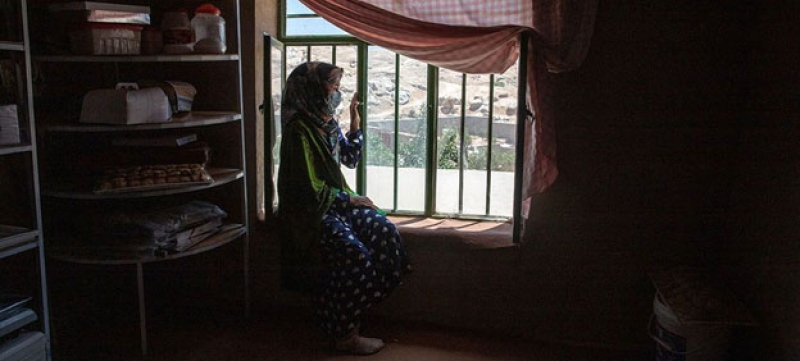- Dhaka’s Per Capita Income Rises to USD 5,163 |
- DSE turnover dips 18% despite weekly gains in key indices |
- 65 Nations Sign UN Treaty to Combat Cybercrime Globally |
- Dhaka’s air quality ‘unhealthy’ 5th worst in world Saturday |
- Dhaka’s air recorded unhealthy on Friday morning |
Internet Blackout Cuts Afghan Women’s Vital Lifeline

Women’s rights have steadily eroded in Afghanistan since 2021. Credit: UN Women
When the Taliban recently cut off the Internet and phone networks across Afghanistan, millions of women and girls were silenced. For those with connectivity, the blackout severed their last link to the outside world – a fragile connection that had kept education, work, and hope alive.
Many women in Afghanistan still lack access to the Internet, a basic phone, or the literacy to use digital tools. For those who do, that connection is a rare lifeline to life-saving services and the outside world.
For now, access has largely been restored. But the message was clear: in Afghanistan, this valuable gateway to learning, expression, and services for women and girls can be shut down at any moment.
Afghan women are already banned from secondary and higher education, from most forms of work, and from public spaces such as parks, gyms, and sports clubs.
Many women also depend on humanitarian aid, including those in earthquake-affected eastern Afghanistan and among returnees – many forcibly – from Iran and Pakistan.
The digital and phone blackout intensified feelings of stress, isolation, and anxiety among women and girls.
What happens when Afghan women and girls go offline?
In Afghanistan, the impact of Internet and phone blackouts falls most heavily on women and girls. It eliminates what is, for many, a final means of learning, earning, and connecting.
When women and girls lose Internet access, they lose the ability to:
• Access aid: Those who are connected can use the Internet or phones to learn about available support, and aid agencies rely on connectivity to continue operations.
• Learn about disasters: Recent data show that 9 per cent of women use the Internet to access information on climate disasters.
• Seek services: Survivors of gender-based violence or those at risk depend on digital reporting and support mechanisms.
• Learn: Online classes and study groups were a lifeline for girls banned from secondary schools and for women barred from universities.
• Work: Online businesses are a vital source of income for many women to sustain their families after being pushed out of formal jobs.
• Connect: Social apps and media platforms provided safe spaces to support one another and exchange information.
• Be visible: For women already excluded from public life, the digital world remains one of the last spaces to exist and resist.
Going dark in the middle of a humanitarian crisis
The national Internet blackout began a month after a 6.0-magnitude earthquake struck eastern Afghanistan on 31 August, with major aftershocks continuing throughout September as emergency response and recovery efforts persisted.
Despite many challenges, women-led organizations have played a crucial role in delivering life-saving aid and services to women and girls affected by the earthquake, as well as to Afghan women and girl returnees from neighbouring Iran and Pakistan.
During the blackout, NGOs were forced to halt humanitarian operations and suspend field missions to emergency sites. Staff could not process payments or place orders for essential goods destined for women and their families.
When banks went offline, women affected by the crisis were unable to access emergency cash assistance to buy essentials such as food.
The shutdown also made it much harder for survivors of gender-based violence to seek help at a time when household tensions were rising and the risk of violence escalating.
A UN Women team assessed earthquake damage in Nurgal, one of the worst-affected districts in Kunar province, northeastern Afghanistan.
Online livelihoods switched off
In Afghanistan, waves of directives banning women from most jobs and restricting their movement without a male guardian have systematically pushed them out of public life.
For many women entrepreneurs, the Internet offers a rare space to work, build small businesses, and sell their products – such as nuts, spices, handicrafts, clothes, and artworks – to customers within Afghanistan and abroad.
“There is no space for us to work outside our homes,” explained business owner Sama, from Parwan in eastern Afghanistan. “There’s also no local market where we can display and sell our products.”
With the support of UN Women, Sama built an online shop selling knitted bags, purses, and jewellery.
“Through my online shop, I became well known,” she says. “I’m earning money, solving my financial problems, and becoming self-sufficient.”
When the blackout struck, women like Sama lost their only source of income overnight – a stark reminder that for many Afghan women, connectivity is not a luxury but a lifeline.
From blackout to global action
The Internet blackout in Afghanistan was a stark reminder that the digital world is not neutral. It can be a space of empowerment – or a tool of exclusion and isolation.
The stories of Afghan women remind us what is at stake: education, mental health, livelihoods, and hope. When women are silenced online, they are cut off further from opportunity and from the world.
How UN Women is supporting women and girls in Afghanistan
Through its flagship programme Rebuilding the Women’s Movement, UN Women in Afghanistan has partnered with 140 women-led organizations across 24 provinces and supported 743 women staff with salaries and training – amplifying resilience even as public life remains restricted.

